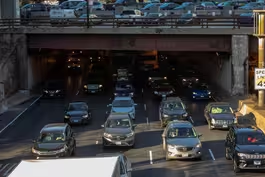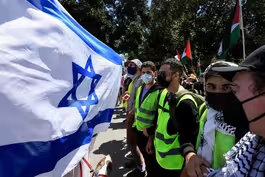
Hezbollah barrage raises fears about war in northern Israel
Clip: 6/12/2024 | 6m 6sVideo has Closed Captions
Hezbollah rocket barrage into Israel raises fears about war in the north
In response to an Israeli strike that killed a senior commander, Hezbollah launched one of its largest salvos into northern Israel, sparking fires. Some 60,000 Israelis are displaced from the north. Nick Schifrin reports on what life is like for them and in their hometowns.
Problems playing video? | Closed Captioning Feedback
Problems playing video? | Closed Captioning Feedback
Major corporate funding for the PBS News Hour is provided by BDO, BNSF, Consumer Cellular, American Cruise Lines, and Raymond James. Funding for the PBS NewsHour Weekend is provided by...

Hezbollah barrage raises fears about war in northern Israel
Clip: 6/12/2024 | 6m 6sVideo has Closed Captions
In response to an Israeli strike that killed a senior commander, Hezbollah launched one of its largest salvos into northern Israel, sparking fires. Some 60,000 Israelis are displaced from the north. Nick Schifrin reports on what life is like for them and in their hometowns.
Problems playing video? | Closed Captioning Feedback
How to Watch PBS News Hour
PBS News Hour is available to stream on pbs.org and the free PBS App, available on iPhone, Apple TV, Android TV, Android smartphones, Amazon Fire TV, Amazon Fire Tablet, Roku, Samsung Smart TV, and Vizio.
Providing Support for PBS.org
Learn Moreabout PBS online sponsorshipAnd, today, in response to an Israeli strike that killed a senior commander, Hezbollah launched one of its largest salvos into Northern Israel, sparking fires.
Some 60,000 Israelis are displaced from the north.
And to understand what life is like for them and in their hometowns, we visited Kiryat Shmona and found a region on edge.
In Northern Israel, panic and fear.
Israelis celebrating a Jewish holiday run for cover, as Israeli air defense intercept Hezbollah rockets.
Across the region, there is constant anxiety for a threat that empties celebrations and also cities.
This is Kiryat Shmona, the biggest town in Israel's north, former population 24,000, today all but deserted, malls once bustling now empty.
Much of the city is frozen in time, supermarkets closed, playgrounds silent, roads and buildings pierced by rockets fired from Lebanon just one mile up the road.
And so the city's staff who remain are under threat and often underground.
Mayor Avichai Stern holds his meetings in a bomb shelter.
He takes a rare trip upstairs to his office in a city where he was born and raised.
AVICHAI STERN, Mayor of Kiryat Shmona, Israel (through translator): In 2015, Hezbollah has published a video on how it will conquer the Galilee, the same scenario as we saw in October in the south.
I do not underestimate them.
They can cause much larger damage than Hamas.
It's always better if we're the first to attack.
NICK SCHIFRIN: That call to go on the offense is shared by some senior members of the military, a response to eight months of thousands of Hezbollah rockets, missiles and armed drones fired into Israel.
Today, Israel identified more than 200 launches, what Hezbollah called a response to Israel's killing a senior Hezbollah commander yesterday in Lebanon.
Since October the 7th, nearly 300 Hezbollah fighters and more than 80 Lebanese civilians have been killed, as have 20 Israeli soldiers and a dozen Israeli civilians.
Since October the 7th, Kiryat Shmona has been directly hit more than 200 times.
And that's ignited wildfires, shrapnel from rockets, and air defense missiles land on abandoned backyards, creating infernos.
In Kiryat Shmona and across the north, 90,000 acres have burned.
Mayor Stern admits many residents won't ever come back.
AVICHAI STERN (through translator): Unfortunately, 40 percent of the people in my city said she didn't come back to the city after the war.
Tal Ouziel Carmel is the mayor's assistant and a city engineer.
QUESTION: So how do you know when to go to the shelter?
TAL OUZIEL CARMEL, Kiryat Shmona City Engineer: If we hear like a really loud boom, we just run.
NICK SCHIFRIN: Last week in Kiryat Shmona, Prime Minister Benjamin Netanyahu promised that Hezbollah would be punished.
BENJAMIN NETANYAHU, Israeli Prime Minister (through translator): Whoever thinks that they can harm us and we will sit idly by is making a big mistake.
NICK SCHIFRIN: But he didn't meet Mayor Stern, who's frustrated with what he calls government neglect.
AVICHAI STERN (through translator): If they really want to assist the area and the people that live here, then it's expected that they would come here and listen to our hardships, go to the hotels and listen to the evacuees.
I think that's what someone who really wanted to help would do, and not just come here for the photo opportunity.
NICK SCHIFRIN: Kiryat Shmona's evacuees live in 300 hotels across the country with 5,000 of the displaced in Tel Aviv.
Three-month-old Eve's family is from Kiryat Shmona, but she's never been there, and her first home is a hotel.
They're all making the best of a situation that no one expected would last this long.
CARMELA COHEN, Displaced Resident of Kiryat Shmona: I want come to home, all the family, friends, neighbors, all my life.
NICK SCHIFRIN: Matan coordinates Kiryat Shmona and all of the evacuees living in Tel Aviv.
He used to live in Detroit.
MATAN SCHWARTZ, Evacuee Coordinator: There's no vision.
No one knows when we're going back.
The uncertainty is the main challenge, is, when, where, how long?
Is it a month from now?
Is it a year from now?
Is it two years from now?
MOSHE DAVIDOVITCH, Mateh Asher Regional Council: There is no hope, and though -- they are not knowing when and how they will get back.
NICK SCHIFRIN: Moshe Davidovitch heads the regional council of Mateh Asher, with 17,000 residents from dozens of villages.
He says the map of Northern Israel has already been redrawn.
MOSHE DAVIDOVITCH: Hezbollah is the owner now of our villages.
This is a dead zone.
There is no culture.
There is no agriculture.
There is no tourism.
There is no salary.
There is no nothing.
NICK SCHIFRIN: That anger comes from a sense of insecurity.
Ishai Ephroni is the council's security chief, constantly reminded of Hamas' Hostages.
In the control room, he can monitor regional threats, including in his own evacuated kibbutz just 150 yards from the border.
ISHAI EPHRONI, Mateh Asher Regional Council: Look at the streets, totally empty.
You don't see anyone walking here.
Look, all empty, no cars, nothing.
NICK SCHIFRIN: He too predicts war, but would prefer a diplomatic agreement.
And he wants to preserve and protect this place so residents can return.
ISHAI EPHRONI: That's what we need from the government, to do something, to tell us when we're going to be back, and to give the army to protect us, and to make the people believe and feel safe again to go back home.
NICK SCHIFRIN: Last week, Netanyahu sent senior officials to try and provide Davidovitch reassurance.
He still demands a plan for when people can return, and he remains angry and worried that any Israeli action to make this area safe could lead to escalation and a hot, dangerous summer.
For the "PBS NewsHour," I'm Nick Schifrin.
Expensive parts on modern cars have driven up repair costs
Video has Closed Captions
Clip: 6/12/2024 | 8m 32s | How expensive parts on modern cars have driven up repair and insurance costs (8m 32s)
Gaza war reopens old divisions, reveals new ones in U.S.
Video has Closed Captions
Clip: 6/12/2024 | 14m 3s | Israel-Hamas war reopens old divisions and reveals new ones among Americans (14m 3s)
Hunter Biden trial highlights addiction struggle in U.S.
Video has Closed Captions
Clip: 6/12/2024 | 5m 58s | Hunter Biden trial highlights experience of Americans struggling with addiction (5m 58s)
Israel and Hamas appear far from cease-fire agreement
Video has Closed Captions
Clip: 6/12/2024 | 2m 48s | Israel and Hamas appear far from cease-fire agreement (2m 48s)
'The Fall of Roe' looks at players in anti-abortion movement
Video has Closed Captions
Clip: 6/12/2024 | 7m 43s | 'The Fall of Roe' looks at players in movement to end abortion and what may be next (7m 43s)
Providing Support for PBS.org
Learn Moreabout PBS online sponsorship
- News and Public Affairs

FRONTLINE is investigative journalism that questions, explains and changes our world.

- News and Public Affairs

Amanpour and Company features conversations with leaders and decision makers.












Support for PBS provided by:
Major corporate funding for the PBS News Hour is provided by BDO, BNSF, Consumer Cellular, American Cruise Lines, and Raymond James. Funding for the PBS NewsHour Weekend is provided by...




